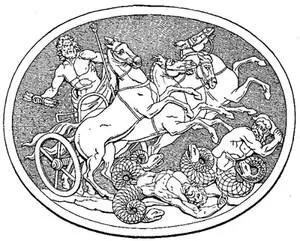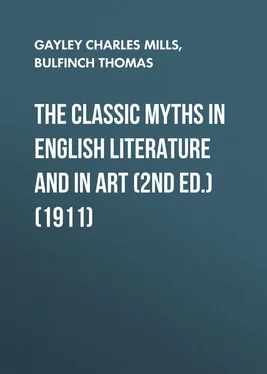Thomas Bulfinch - The Classic Myths in English Literature and in Art (2nd ed.) (1911)
Здесь есть возможность читать онлайн «Thomas Bulfinch - The Classic Myths in English Literature and in Art (2nd ed.) (1911)» — ознакомительный отрывок электронной книги совершенно бесплатно, а после прочтения отрывка купить полную версию. В некоторых случаях можно слушать аудио, скачать через торрент в формате fb2 и присутствует краткое содержание. Жанр: foreign_antique, foreign_prose, на английском языке. Описание произведения, (предисловие) а так же отзывы посетителей доступны на портале библиотеки ЛибКат.
- Название:The Classic Myths in English Literature and in Art (2nd ed.) (1911)
- Автор:
- Жанр:
- Год:неизвестен
- ISBN:нет данных
- Рейтинг книги:4 / 5. Голосов: 1
-
Избранное:Добавить в избранное
- Отзывы:
-
Ваша оценка:
- 80
- 1
- 2
- 3
- 4
- 5
The Classic Myths in English Literature and in Art (2nd ed.) (1911): краткое содержание, описание и аннотация
Предлагаем к чтению аннотацию, описание, краткое содержание или предисловие (зависит от того, что написал сам автор книги «The Classic Myths in English Literature and in Art (2nd ed.) (1911)»). Если вы не нашли необходимую информацию о книге — напишите в комментариях, мы постараемся отыскать её.
The Classic Myths in English Literature and in Art (2nd ed.) (1911) — читать онлайн ознакомительный отрывок
Ниже представлен текст книги, разбитый по страницам. Система сохранения места последней прочитанной страницы, позволяет с удобством читать онлайн бесплатно книгу «The Classic Myths in English Literature and in Art (2nd ed.) (1911)», без необходимости каждый раз заново искать на чём Вы остановились. Поставьте закладку, и сможете в любой момент перейти на страницу, на которой закончили чтение.
Интервал:
Закладка:

Fig. 3. Zeus and Giants
9. The Origin of Manwas a question which the Greeks did not settle so easily as the Hebrews. Greek traditions do not trace all mankind to an original pair. On the contrary, the generally received opinion was that men grew out of trees and stones, or were produced by the rivers or the sea. Some said that men and gods were both derived from Mother Earth, hence both autochthonous ; and some, indeed, claimed an antiquity for the human race equal to that of the divinities. All narratives, however, agree in one statement, – that the gods maintained intimate relations with men until, because of the growing sinfulness and arrogance of mankind, it became necessary for the immortals to withdraw their favor.
10. Prometheus, a Creator.There is a story which attributes the making of man to Prometheus, whose father Iapetus had, with Cronus, opposed the sovereignty of Jupiter. In that conflict, Prometheus, gifted with prophetic wisdom, had adopted the cause of the Olympian deities. To him and his brother Epimetheus was now committed the office of making man and providing him and all other animals with the faculties necessary for their preservation. Prometheus was to overlook the work of Epimetheus. Epimetheus proceeded to bestow upon the different animals the various gifts of courage, strength, swiftness, sagacity; wings to one, claws to another, a shelly covering to a third. But Prometheus himself made a nobler animal than these. Taking some earth and kneading it with water, he made man in the image of the gods. He gave him an upright stature, so that while other animals turn their faces toward the earth, man gazes on the stars. Then since Epimetheus, always rash, and thoughtful when too late, had been so prodigal of his gifts to other animals that no blessing was left worth conferring upon the noblest of creatures, Prometheus ascended to heaven, lighted his torch at the chariot of the sun, and brought down fire. With fire in his possession man would be able to win her secrets and treasures from the earth, to develop commerce, science, and the arts.

Fig. 4. Prometheus making Man
11. The Age of Gold.Whether in this or in other ways the world was furnished with inhabitants, the first age was an age of innocence and happiness. Truth and right prevailed, though not enforced by law, nor was there any in authority to threaten or to punish. The forest had not yet been robbed of its trees to yield timbers for vessels, nor had men built fortifications round their towns. There were no such things as swords, spears, or helmets. The earth brought forth all things necessary for man, without his labor in plowing or sowing. Perpetual spring reigned, flowers sprang up without seed, the rivers flowed with milk and wine, and yellow honey distilled from the oaks. This Golden Age had begun in the reign of Cronus. 8 8 Consequently the creation of these men could not be assigned to Prometheus, – unless they were made by him before the war of the Titans.
And when these heroes fell asleep in death, they were translated in a pleasant dream to a spiritual existence, in which, unseen by mortal eyes, they still attended men as monitors and guardians.
12. The Silver Agecame next, inferior to the golden. Jupiter shortened the spring, and divided the year into seasons. Then, first, men suffered the extremes of heat and cold, and houses became necessary. Caves were their dwellings, – and leafy coverts of the woods, and huts woven of twigs. Crops would no longer grow without planting. The farmer was constrained to sow the seed, and the ox to draw the plow. This was a race of manly men, but insolent and impious. And when they died, Jupiter made them ghosts of the underworld, but withheld the privilege of immortal life.
13. Prometheus, Champion of Man.During this age when, as Hesiod says, the altars of the blessed were neglected, and the gods were denied their due, Prometheus stood forth – the champion of man against the Olympians. 9 9 There is uncertainty as to the mythical period of these events. The order here given seems to me well grounded. Hes. Works and Days, 180; Theog. 790-910.
For the son of Cronus had grudged mortals the use of fire, and was, in fact, contemplating their annihilation and the creation of a new race. Therefore, once upon a time, when gods and men were in dispute at Sicyon concerning the prerogatives of each, Prometheus, by an ingenious trick, attempted to settle the question in favor of man. Dividing into two portions a sacrificial bull, he wrapped all the eatable parts in the skin, cunningly surmounted with uninviting entrails; but the bones he garnished with a plausible mass of fat. He then offered Jupiter his choice. The king of Heaven, although he perceived the intended fraud, took the heap of bones and fat, and, forthwith availing himself of this insult as an excuse for punishing mankind, deprived the race of fire. But Prometheus regained the treasure, stealing it from Heaven in a hollow tube.
14. Pandora.Doubly enraged, Jupiter, in his turn, had recourse to stratagem. He is declared to have planned for man a curse in the shape of woman. How the race had persisted hitherto without woman is a mystery; but that it had done so, with no slight degree of happiness, the experience of the Golden Age would seem to prove. However, the bewitching evil was fashioned, – in Heaven, properly enough, – and every god and goddess contributed something to her perfection. One gave her beauty, another persuasive charm, a third the faculty of music. And they named her Pandora, "the gift of all the gods." Thus equipped, she was conveyed to earth and presented to Epimetheus, who, without hesitation, accepted the gift, though cautioned by his brother to beware of Jupiter and all his ways. And the caution was not groundless. In the hand of Pandora had been placed by the immortals a casket or vase which she was forbidden to open. Overcome by an unaccountable curiosity to know what this vessel contained, she one day lifted the cover and looked in. Forthwith there escaped a multitude of plagues for hapless man – gout, rheumatism, and colic for his body; envy, spite, and revenge for his mind – and scattered themselves far and wide. Pandora hastened to replace the lid; but one thing only remained in the casket, and that was hope .
15. Prometheus Bound.Because of his unselfish devotion to the cause of humanity, Prometheus drew down on himself the anger of Olympian Jove, by whose order he was chained to a rock on Mount Caucasus, and subjected to the attack of an eagle (or a vulture) which, for ages, preyed upon his liver, yet succeeded not in consuming it. This state of torment might have been brought to an end at any time by Prometheus, if he had been willing to submit to his oppressor; for he possessed a secret which involved the stability of Jove's throne. This was that by a certain woman Jove would beget a son who should displace him and end the sway of the Olympians. The god naturally desired more accurate information of this decree of Fate. But to reveal the secret Prometheus disdained. In this steadfastness the Titan was supported by the knowledge that in the thirteenth generation there should arrive a hero, – sprung from Jove himself, – to release him. 10 10 §§ 156, 161, 191 and Commentary, § 10.
And in fullness of time the hero did arrive: none other than the mighty Hercules desirous of rendering the highest service to mankind. No higher service, thinks this radiant and masterful personage, – who, as we shall see, had already cleared the world of many a monster, – remains to be performed than to free the champion of mankind, suffering through the ages because he had brought light into the world. "The soul of man," says Hercules to the Titan —
Интервал:
Закладка:
Похожие книги на «The Classic Myths in English Literature and in Art (2nd ed.) (1911)»
Представляем Вашему вниманию похожие книги на «The Classic Myths in English Literature and in Art (2nd ed.) (1911)» списком для выбора. Мы отобрали схожую по названию и смыслу литературу в надежде предоставить читателям больше вариантов отыскать новые, интересные, ещё непрочитанные произведения.
Обсуждение, отзывы о книге «The Classic Myths in English Literature and in Art (2nd ed.) (1911)» и просто собственные мнения читателей. Оставьте ваши комментарии, напишите, что Вы думаете о произведении, его смысле или главных героях. Укажите что конкретно понравилось, а что нет, и почему Вы так считаете.












